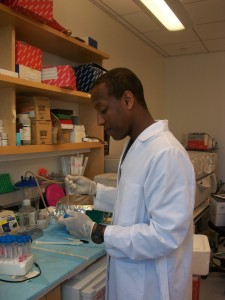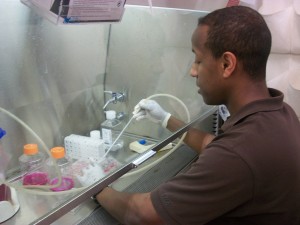From Yonathan Ararso ’13:
This summer I am in New York City working for a Howard Hughes Medical Institute (HHMI) summer research program at Weill Cornell Medical College. The experience has been great thus far. My department, Ansary Stem Cell Institute, is led by Dr. Shahin Rafii whose work encompasses stem cell, vascular, and cancer biology. In addition to several Ph.D. and M.D. students, the lab consists of post docs, traveling physicians, and researchers from all over the world including China, France, Russia, and Israel. Though the first couple of weeks of my stay heavily focused on learning experimental and instrumental techniques relevant to my project, I have finally gotten more independent and started to work on my own.
My project deals with recent evidence that has pointed to the heavy correlation between human cancers and cells displaying stem cell-like properties that promote and maintain the successful growth of tumors. Commonly known as cancer stem cells (CSC), these cells have been shown to secret angiogenic factors like vascular endothelial growth factor-A (VEGF-A) responsible for activating the growth and formation of endothelial cells (EC). These EC are in turn responsible for the formation of vascular structures including blood vessels that promote and further aid the growth and expansion of tumors. One proposed mechanism for activation of CSC is the Notch signaling pathway, which is heavily linked with regulating cell fate determination especially in stem cells.
Multiple studies have linked aberrant Notch signaling with tumorigenesis. However, the specific role of the pathway in the context of angiogenesis, tumor growth, and proliferation remains elusive. My project, therefore, aims to further investigate specific role of Notch ligands expressed on the EC in breast cancer cells by examining how the inhibition of Notch ligand Jagged 1 affect tumor growth and metastasis. Our experimental hypothesis predicts that selective silencing of Notch ligands such as Jag1 will heavily interfere with the function of ECs and severely compromise the growth and proliferation of breast cancer cells both and in vivo and in vitro models. If so, the study will open doors for more targeted chemotherapeutic treatments with more successful tumor inhibition outcomes.
Outside of lab, I enjoy attending journal club meetings, lectures from traveling scientists, and conferences. I also try to take advantage of concerts, museums, restaurants, and the company of students from all over the country participating in summer programs like ACCESS, Gateways, and Travelers.


